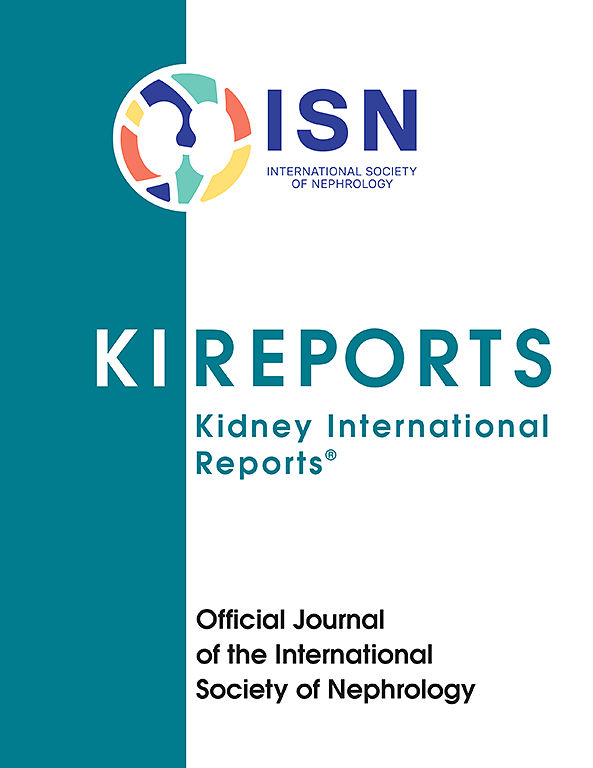Uncovering the Link Between Kynurenic Acid Pathway and Kidney Failure
IF 5.7
2区 医学
Q1 UROLOGY & NEPHROLOGY
引用次数: 0
Abstract
Introduction
Recent studies have focused on some uremic toxins, particularly those derived from tryptophan, as potential modifiable risk factors of chronic kidney disease (CKD) progression. The kynurenine pathway is the major enzymatic pathway for sequentially catabolizing tryptophan, resulting in key metabolites including kynurenine and kynurenic acid (KA) by the aminoadipate aminotransferase. We aimed at evaluating the association of serum KA levels and KA-to-kynurenine ratio (as indicators of aminoadipate aminotransferase activity) with kidney failure.
Methods
The Chronic Kidney Disease-Renal Epidemiology and Information Network (CKD-REIN) study is a prospective cohort of patients with CKD having an estimated glomerular filtration rate (eGFR) < 60 ml/min per 1.73 m2. Baseline samples of uremic toxins were measured using a validated liquid chromatography tandem mass spectrometry technique. Cause-specific Cox models were used to estimate hazard ratios (HRs) for our outcome. The kidney gene expression of the kynurenine pathway was evaluated in 5 or 6 nephrectomy CKD mice and adenine-diet CKD mice under nephroprotective low protein diet (5% w/w).
Results
Over a median follow-up period of 5 years, 608 out of the 2406 patients progressed to kidney failure. A 2-fold increase in serum KA levels and KA-to-kynurenine ratio were respectively associated with a 22% and 20%-increase in the hazard of kidney failure after multiple adjustments. In the mouse model, positive correlation was found between aminoadipate aminotransferase expression and fibrosis-related genes and kidney fibrosis. A low-protein diet was associated with a decrease in aminoadipate aminotransferase expression in the kidney as well as in inflammatory and fibrosis markers.
Conclusion
Our findings suggest that the kynurenine pathway is associated with kidney failure, and that the inhibition of aminoadipate aminotransferase and the subsequent reduction of KA accumulation is a promising target to mitigate kidney disease progression.

揭示尿尿酸途径与肾衰竭之间的联系
最近的研究集中在一些尿毒症毒素,特别是来自色氨酸的毒素,作为慢性肾脏疾病(CKD)进展的潜在可改变的危险因素。犬尿氨酸途径是色氨酸顺序分解代谢的主要酶促途径,通过氨基己二酸转氨酶产生犬尿氨酸和犬尿氨酸酸(KA)等关键代谢产物。我们旨在评估血清KA水平和KA-犬尿氨酸比值(作为氨基己二酸转氨酶活性的指标)与肾衰竭的关系。方法慢性肾脏疾病-肾脏流行病学和信息网络(CKD- rein)研究是一项前瞻性队列研究,研究对象是肾小球滤过率(eGFR)和lt;60毫升/分钟每1.73平方米。基线样本尿毒症毒素测量使用有效的液相色谱串联质谱技术。病因特异性Cox模型用于估计结果的风险比(hr)。研究了5、6只肾切除CKD小鼠和低蛋白(5% w/w)低蛋白饮食(腺嘌呤饮食)CKD小鼠肾脏中犬尿氨酸通路的基因表达。结果在中位5年的随访期间,2406例患者中有608例进展为肾衰竭。多次调整后,血清KA水平和KA-犬尿氨酸比值增加2倍分别与肾衰竭风险增加22%和20%相关。在小鼠模型中,氨基己二酸转氨酶表达与纤维化相关基因与肾纤维化呈正相关。低蛋白饮食与肾脏中氨基己二酸转氨酶表达以及炎症和纤维化标志物的降低有关。结论犬尿氨酸途径与肾衰竭有关,抑制氨基己二酸转氨酶和随后减少KA积累是缓解肾脏疾病进展的一个有希望的靶点。
本文章由计算机程序翻译,如有差异,请以英文原文为准。
求助全文
约1分钟内获得全文
求助全文
来源期刊

Kidney International Reports
Medicine-Nephrology
CiteScore
7.70
自引率
3.30%
发文量
1578
审稿时长
8 weeks
期刊介绍:
Kidney International Reports, an official journal of the International Society of Nephrology, is a peer-reviewed, open access journal devoted to the publication of leading research and developments related to kidney disease. With the primary aim of contributing to improved care of patients with kidney disease, the journal will publish original clinical and select translational articles and educational content related to the pathogenesis, evaluation and management of acute and chronic kidney disease, end stage renal disease (including transplantation), acid-base, fluid and electrolyte disturbances and hypertension. Of particular interest are submissions related to clinical trials, epidemiology, systematic reviews (including meta-analyses) and outcomes research. The journal will also provide a platform for wider dissemination of national and regional guidelines as well as consensus meeting reports.
 求助内容:
求助内容: 应助结果提醒方式:
应助结果提醒方式:


